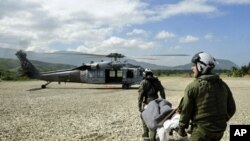The U.S. military says it has stopped flying Haitian earthquake victims to the United States for medical care following concerns by some state governments over who will pay for their treatment.
Military officials say the evacuations were suspended Wednesday, after Florida Governor Charlie Crist asked the federal government to help pay for the care.
The New York Times newspaper, which first reported the suspension, says Florida hospitals have treated more than 500 victims from the January 12 quake. Governor Crist's request did not say how much the care was costing Florida, but the Times says the total could be in the millions of dollars.
The paper said other U.S. states have also taken in Haitians and flights to those states have been halted as well.
In Haiti, the situation remains grim. Despite a large international aid effort, earthquake survivors in and around Port-au-Prince are still struggling to find proper food, water and shelter, two-and-a-half weeks after the quake reduced the capital to rubble.
The United Nations World Food Program (WFP) said Saturday it had started its first systematic food distribution program for Haiti since the earthquake, setting up 16 sites in the capital where only women can collect food.
The WFP says starting Saturday, Haitians will receive coupons entitling each family to 25 kilograms of rice. The first distributions will begin Sunday.
The WFP's executive director Josette Sheeran said the new system will allow the agency to provide food assistance to more people. Its goal is to reach more than two million people in the next two weeks. The WFP says it has already helped nearly 600,000 people since the earthquake.
Meanwhile, Haitians trying to rebuild their lives face daunting obstacles. The 7.0-magnitude quake devastated the poor Caribbean nation, killing an estimated 200,000 people and leaving more than one million homeless.
Many are living in the streets in makeshift camps with little or no sanitation, while the injured crowd hospitals, putting a strain on staff and supplies.
Other health concerns are also growing with reports of diarrhea and other potentially deadly diseases cropping up in camps. World Health Organization spokesman Paul Garwood says U.N. workers will begin a massive vaccination campaign next week against measles, tetanus and diphtheria.
Some information for this report was provided by AP, AFP and Reuters.










